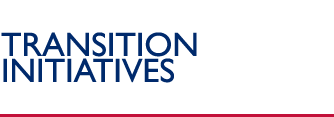USAID/OTI Indonesia Program Description
FY2002 Budget - $6,300,000
Following thirty years of corrupt autocracy under former President Suharto, Indonesia inaugurated the first freely elected government in the country's history in 1999. This milestone, while very positive, unleashed social, economic, and religious tensions throughout the archipelago which have the potential to slow or derail the country's political progress. OTI/Indonesia seeks to assist, accelerate, and secure the process of reform and democratization.
OTI initiated its program in July 1998 and identified five sectors including: supporting the June 1999 general elections; helping civil society organizations to advocate for government reforms; supporting the media to stimulate discussion of political issues; encouraging accountable and transparent governance; and improving civilian-military relations. OTI directed many of its early efforts towards a national cam-paign for religious and ethnic tolerance and the national parliamentary elections. Since the elections, OTI shifted focus to concentrate its activities in the areas of conflict prevention, mitigation and reconciliation, civilian-military relations, good governance, civil society and human rights. OTI's implementing partner in Indonesia is Development Alternatives International (DAI). As OTI hands over its program in October of 2002, many of the OTI activities will be continued by the USAID mission in Jakarta.
Program activities include:
Conflict Prevention, Mitigation and Reconciliation: With the spread of conflicts in the outer islands, OTI shifted its priority program areas in early 2000 to Aceh, Maluku, Irian Jaya, Sulawesi, and East Nusa Tenggara/West Timor. Activities include media campaigns, radio dialogues, and joint task forces made up of government and civil society.
Civilian-Military Relations: OTI is helping enhance civilian capacity for military oversight in areas in-cluding: legislative oversight, military-owned businesses and corruption; territorial affairs; control of natural resources; and inter-ethnic conflict. Activities include monitoring teams and information centers, and local community-security force dialogues.
Good Governance: Activities include parliamentary training and village leader training at the district level, and public information campaigns about government activities.
Civil Society: OTI is assisting civil society organizations to advocate for greater governmental transpar-ency and accountability. Activities include assistance to newly-formed government 'watchdog' organiza-tions, training of newly regional elected parliaments, and locally organized peace campaigns.
Human Rights: OTI supports government and civil society to monitor human rights trials and assist NGOs engage provincial governments in the establishment of human rights laws
Media: OTI supports the training of journalists to understand and cover political issues, and has provided equipment to expand their field reporting, and legal assistance. OTI is also helping civil society groups use media to stimulate public discourse and provide information necessary for informed decision making.
|


